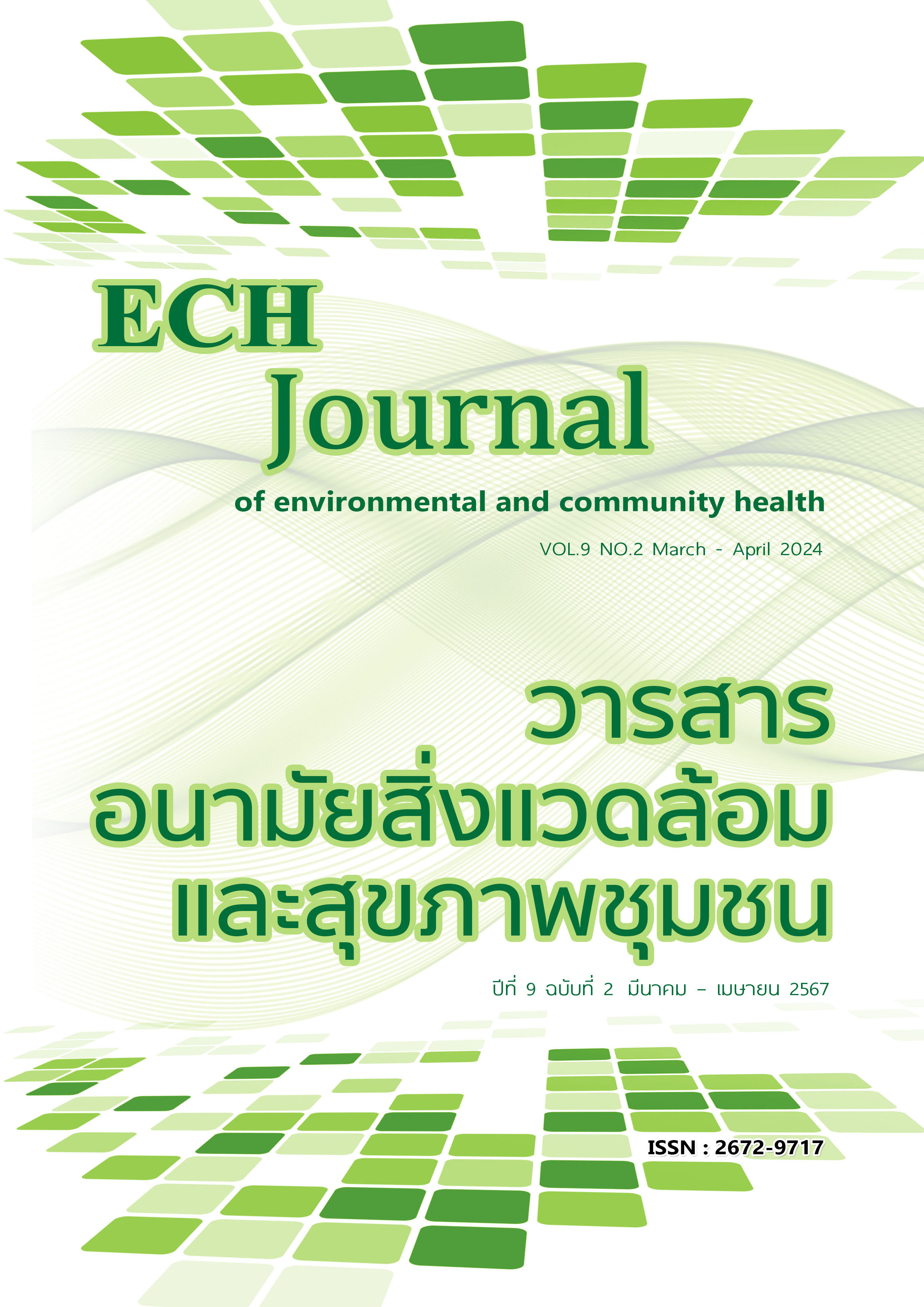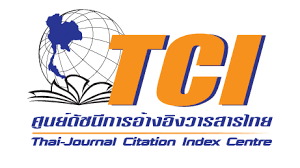ผลของการสนทนากลุ่มเพื่อสร้างแรงจูงใจต่อการควบคุมน้ำตาลในเลือดของผู้ป่วยเบาหวานชนิดที่ 2 ที่ไม่สามารถควบคุมระดับน้ำตาลในเลือดได้ในตำบลหนองญาติ อำเภอเมือง จังหวัดนครพนม
คำสำคัญ:
โปรแกรมสนทนาเพื่อสร้างแรงจูงใจแบบกลุ่ม, การควบคุมน้ำตาลในเลือดบทคัดย่อ
การวิจัยนี้มีวัตถุประสงค์ศึกษาผลของการสนทนากลุ่มเพื่อสร้างแรงจูงใจต่อการควบคุมน้ำตาลในเลือดของผู้ป่วยเบาหวานชนิดที่ 2 ที่ไม่สามารถควบคุมระดับน้ำตาลได้ ออกแบบวิจัยกึ่งทดลองแบบมีกลุ่มควบคุม ขนาดตัวอย่างกลุ่มละ 33 คน ได้มาโดยการสุ่มอย่างง่าย กลุ่มทดลองได้รับโปรแกรมสนทนากลุ่มเพื่อสร้างแรงจูงใจ 12 สัปดาห์ ระหว่างเดือนธันวาคม 2566-มีนาคม 2567 ประเมินการเปลี่ยนแปลงทัศนคติ การรับรู้บรรทัดฐานกลุ่ม การรับรู้การกำกับพฤติกรรมตนเอง พฤติกรรมและระดับน้ำตาลในเลือด เก็บข้อมูลโดยแบบสอบถามชนิดถาม และผลการตรวจระดับน้ำตาลในเลือด วิเคราะห์ข้อมูลด้วยจำนวน ร้อยละ ค่าเฉลี่ยและ ส่วนเบี่ยงเบนมาตรฐาน เปรียบเทียบความแตกต่างค่าเฉลี่ยภายในกลุ่มด้วยสถิติ Parried t-test และระหว่างกลุ่มด้วย Independent t-test พร้อมประมาณช่วงเชื่อมั่นร้อยละ 95 ที่ระดับนัยสำคัญ 0.05 ผลการวิจัย กลุ่มตัวอย่างอายุเฉลี่ย 65.7 ปี และ 65.6 ปี ตามลำดับ ส่วนใหญ่ทั้งสองกลุ่มเป็นเพศหญิง สถานภาพสมรส การศึกษาระดับชั้นมัธยมศึกษาตอนต้นและอาชีพหลักเกษตรกรรม ผลการสนทนากลุ่มเพื่อสร้างแรงจูงใจพบว่า ทัศนคติ การรับรู้บรรทัดฐานกลุ่ม การรับรู้การกำกับพฤติกรรมตนเองและพฤติกรรมการควบคุมระดับน้ำตาลในเลือดในกลุ่มทดลองเพิ่มขึ้นมากกว่าก่อนการทดลองและสูงกว่ากลุ่มควบคุมในระยะหลังการทดลองอย่างมีนัยสำคัญ (p-value<0.05) และระดับน้ำตาลในเลือดในกลุ่มทดลองระยะหลังการทดลองลดลงกว่าระยะก่อนการทดลองอย่างมีนัยสำคัญทางสถิติ (p-value<0.01) และแตกต่างจากลุ่มควบคุมในระยะหลังการทดลองอย่างมีนัยสำคัญทางสถิติ (p-value<0.01)
เอกสารอ้างอิง
WHO. Diabetes [Internet]. 2023 [cited 2023 Jan 22]. Available from: https://www.who.int/health-topics/diabetes#tab=tab_1
Zhang, P., Zhang, X., Brown, J., Vistisen, D., Sicree, R., Shaw, J., Nichols, G. Global healthcare expenditure on diabetes for 2010 and 2030. Diabetes Res Clin Pr. 2010;(87):293–303.
Sarwar, N., Gao, P., Seshasai, SR., Gobin, R., Kaptoge, S., Di Angelantonio, et al. Diabetes mellitus, fasting blood glucose concentration, and risk of vascular disease: a collaborative meta-analysis of 102 prospective studies. Lancet. 2010;26(375):2215–22.
Vision Loss Expert Group of the Global Burden of Disease Study. Causes of blindness and vision impairment in 2020 and trends over 30 years, and prevalence of avoidable blindness in relation to VISION 2020: the Right to Sight: an analysis for the Global Burden of Disease Study GBD 2019 Blindness and Vision Impairment Collaborators. Lancet Glob Health. 2021;9:ำ141-160.
Saran, R. Li, L., Robinson, B., & et al. US Renal Data System 2014 Annual Data Report: Epidemiology of Kidney Disease in the United States. Am J Kidney Dis. 2015;66(1 (supp)):s1305-316.
Hu, G., Jousllahti, P. & Barengo, N.C. Physical activity, cardiovascular risk factors, and mortality among Finnish adults with diabetes. Diabetes Care. 2005;28(799–805).
Carol, E., Koro, S.J.B., Bourgeois, N., Fedder, D.O. Glycemic Control From 1988 to 2000 Among U.S. Adults Diagnosed With Type 2 Diabetes: A preliminary report. Diabetes Care. 2004;27(1):17–20.
Sun, J. & Buys, N.J. Glucose- and glycaemic factor-lowering effects of probiotics on diabetes: a meta-analysis of randomised placebo-controlled trials. Br J Nutr. 2016;115(7):1167–77.
Chapman, A., Liu, S., Merkouris, S., Enticott, J.C., & et al.et al. Psychological Interventions for the Management of Glycemic and Psychological Outcomes of Type 2 Diabetes Mellitus in China: A Systematic Review and Meta-Analyses of Randomized Controlled Trials. Front Public Health. 2015;3:252–66.
Tolin, D.F. Is cognitive–behavioral therapy more effective than other therapies?: A meta-analytic review. Clin Psychol Rev. 2010;30(6):710–20.
Winkley, K., Upsher, R., Stahl, D., Pollard, D., Brennan, A., Heller, S., et al. Systematic review and meta-analysis of randomized controlled trials of psychological interventions to improve glycaemic control in children and adults with type 1 diabetes. Diabetes Med. 2020;37(5):735–46.
Maslakpak, M.H., Parizad, N., Ghahremani, A. & Alinejad, V.. The effect of motivational interviewing on the self-efficacy of people with type 2 diabetes: A randomised controlled trial. J Diabetes Nurs. 2021;25(4):1–8.
กฤตกร หมั่นสระเกษ, ทัศนีย์ รวิวรกุล และ, สุนีย์ ละกำปั่น. ผลของโปรแกรมการจัดการตนเองต่อการควบคุมระดับน้ำตาลในเลือดของผู้ป่วยเบาหวานชนิดที่ 2 ที่ใช้อินซูลิน. วารสารวิทยาลัยพยาบาลบรมราชชนนีนครราชสีมา. 2019;25(2):87–103.
Rubak, S., Sanbaek, A., Laurizen, T.. & Christensen, B. Motivational interviewing: a systematic review and meta-analysis. Br J Gen Pract. 2005;55:305–12.
Hall, K., Gibbie, T. & Lubman, D.I. Motivational interviewing techniques Facilitating behaviour change in the general practice setting. Austrlian Fam Physician. 2012;41(9):660–7.
กลุ่มรายงานมาตรฐาน สำนักงานสาธารณสุขจังหวัดนครพนม. รายงานตามตัวชี้วัดใน NCDs ClinicPlus [Internet]. 2566. Available from: https://npm.hdc.moph.go.th/hdc/reports/report_kpi.php
กรมสนับสนุนบริการสุขภาพ กระทรวงสาธารณสุข. รายงานข้อมูลตำบลหนองญาติ [Internet]. 2565. Available from: https://3doctor.hss.moph.go.th/main/rp_village?region
Chow, S-C., Shao, J., Wang, H., Lokhnygina, Y. Sample Size Calculations in Clinical Research. 3rd ed. New York: Chapman and Hall/CRC; 2017.
คลินิกโรคเรื้อรัง โรงพยาบาลส่งเสริมสุขภาพตำบลหนองญาติ. รายงานการดำเนินงานคลินิกเบาหวาน โรงพยาบาลส่งเสริมสุขภาพตำบลหนองญาติ. นครพนม: (เอกสารอัดสำเนา); 2565.
Ajzen, I. The Theory of planned behavior. Organ Behav Hum Decis Process. 1991;50(2):179–211.
Miller, W. R., & Rollnick, S. Motivational interviewing: Preparing people to change addictive behavior. 2nd ed. New Yor: Guilford Press.; 2002.
Söderlund, L.L. Motivational interviewing in Theory and practice [Medical Dissertations]. [Sweden]: Division of Community Medicine Department of Medical and Health Sciences Linköping University; 2010.
Malcolm, J., Hodkinson, P., & Colley, H. The interrelationships between informal and formal learning. J Workplace Learn. 2003;15:313–8.
Ornsuda Lertbannaphong, Pimonsri Hantanasiriskul, Pornpimol Kiattisakthavee, Sunsanee, Ruangson, Nantawat Sitdhiraksa & Jeerunda Santiprabhob. Effect of Diabetes Self-Management Education (DSME) with and without Motivational Interviewing(MI) on Glycemic Control among Children and Adolescents with Type 1 Diabetes Mellitus: A Randomized Controlled Trial. Siriraj Med J. 2021;73:635–43.
ลักษณา พงษ์ภุมมา, ขวัญตา เพชรมณีโชติ, เชษฐา แก้วพรมและเมทณี ระดาบุตร. ผลของโปรแกรมการสัมภาษณ์เพื่อสร้างแรงจูงใจต่อความรู้ พฤติกรรมการดูแลสุขภาพตนเองและดัชนีมวลกายในวัยผู้ใหญ่ที่มีปัจจัยเสี่ยงต่อการเกิด โรคเบาหวานชนิดที่ 2. วารสารวิจัยทางวิทยาศาสตร์สุขภาพ. 2563;14(1):21–31.
Li, Z., Chen, Q., Yan, J., Liang, W., William, C. & Wong, W. Effectiveness of motivational interviewing on improving Care for Patients with type 2 diabetes in China: A randomized controlled trial. BMC Health Serv Res. 2020;20(57):1–9.
Seki, H. & Buyuksoy, G.D. The Effects of Motivational Interview on Healthy Behaviour and Quality of Life in the Uncontrolled Type 2 Diabetes Patients. Int J Caring Sci. 2022;15(2):1194–201.
WHO. Diabetes [Internet]. 2022 [cited 2023 Oct 12]. Available from: https://www.who.int/health-topics/diabetes?gad_source=1&gclid=CjwKCAiAopuvBhBCEiwAm8jaMZVpwyHFU_SPyHEZX23Q0ScTfCyIzr3gS_6TqAX-VA8sugBSZWgo5RoC03EQAvD_BwE#tab=tab_1
Rasouli M, Sokhan GA, Keramat A, Khosravi A, Fooladi E,, Mousavi SA. The impact of motivational interviewing on participation in childbirth preparation classes and having a natural delivery. BJOG. 2017;124:631–9.
Mansour Shakiba, Maryam Navaee, Yassamin Hassanzei. The effect of motivational interviewing on attitude and practice about type of delivery in primigravid women requesting elective cesarean section referring to comprehensive health services centers. J Educ Health Promot. 2020;9:1–8.
Ajzen, I. Constructing a theory of planned behavior questionnaires [Internet]. 2010 [cited 2022 Feb 12]. Available from: https://people.umass.edu/aizen/pdf/tpb.measurement.pdf
Atkins, R. Self-efficacy and the promotion of health for depressed single mothers. Ment Health Fam Med. 2010;7:155–68.
Masumeh Hemmati Maslakpak, Naser Parizad, Amir Ghahremani & Vahid Alinejad. The effect of motivational interviewing on the self-efficacy of people with type 2 diabetes: A randomised controlled trial. J Diabetes Nurs. 2021;25(4):1–8.
Hasan Evcimen, Fatos Uncu & Ihsan Esen. Investigation of the Effect of Motivational Interviewing on Self-Efficacy Levels in Adolescents with Type 1 Diabetes Mellitus. Int J Caring Sci. 2021;14(1):298–301.
Wagner, C.C., & Ingersoll, K.S. Motivational Interviewing in Groups. New York: Guilford Press; 2012.
Ajzen, I. The theory of planned behavior. Organ Behav Hum Decis. 1991;(50):179–211.
Hershey, D. & Henkens, K. Impact of different types of retirement transition on perceived satisfaction with life. Gerontologist. 2013;54:233–44.





